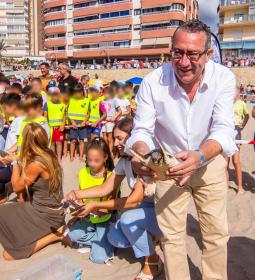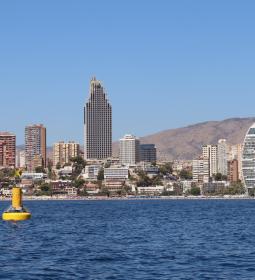The three beaches have already returned to normal after confirming the rescue teams the absence of more hydrozoa
Benidorm activates for two hours the protocol because of Portuguese caravel on its beaches after detecting two specimens

Benidorm City Hall has activated this morning the protocol because of Portuguese caravels to detect two copies in waters of the city, and that have been withdrawn by the rescue services. As a precaution and for an hour, bathing has been prohibited on the beaches of Levante and Poniente, and for just over two in Mal Pas. The first specimen was located on Mal Pas beach, and the second on the Levante floating platform in one of the batters made by the rescue teams after the protocol was activated. Now, the three beaches operate normally.
The Councilor for Beaches, Mónica Gómez, explained that "following the protocols established, after detecting the first specimen in Mal Pas, the red flag and jellyfish flag were placed on this beach; a measure that has subsequently been extended to Levante and Poniente. "
Immediately the boats of the Local Police and the company concessionaire of the beaches have made batidas and inspections by all the bay in search of other possible units. After confirming the absence of more Portuguese caravels, the bath has been allowed again in the first place in Levante and Poniente, and later in Mal Pas. At this time, and as a precaution, on the three beaches waves the yellow flag and jellyfish.
Gómez has indicated that "seven people have been treated at the beach of Mal Pas by minor bites of this false jellyfish." Of these, "five have been transferred, as a precaution and as protocols indicate, to the hospital in Villajoyosa where they have been followed up on the bite." At this time, "only one remains under observation although it is not serious, and the other five have not presented adverse reactions."
The councilwoman said that "we have acted quickly and diligently, following all established protocols, and preventing bathing as a precaution to check that there were no more copies." He also stressed that "the Mediterranean coast is not the usual habitat of these false jellyfish, so their presence is fortunately usually testimonial."







